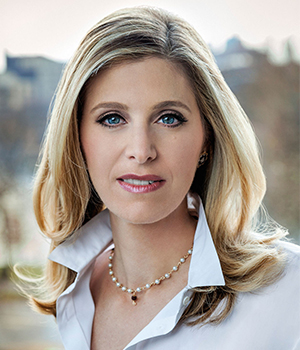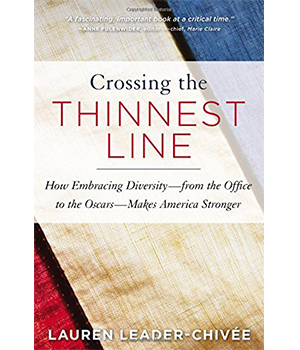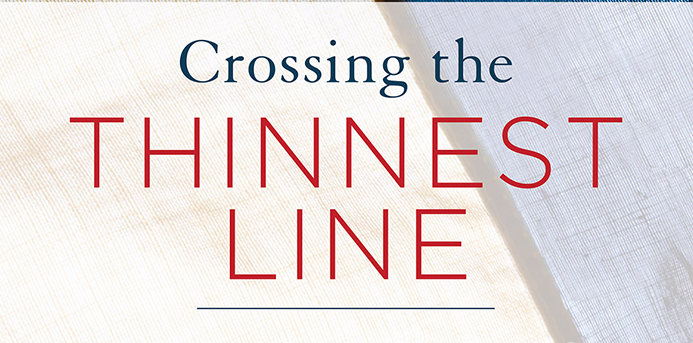As the co-founder of All in Together, a nonpartisan nonprofit working to engage U.S. women in politics and civic action, and executive advisor to Deloitte, Lauren Leader-Chivée has devoted her life to promoting diversity in politics, the workplace and beyond.
Now, with her book “Crossing the Thinnest Line: How Embracing Diversity from the Office to the Oscars Makes America Stronger” (available Sept. 20), Leader-Chivée looks at diversity as America’s most important asset and shows how we, as individuals, parents, and as a nation, can do better.
Make It Better: Before we talk about your new book, tell us about All in Together.

Lauren Leader-Chivée: I’ve been working on diversity and leadership issues for a long time and there were a couple pieces that really jumped out at me. One is that, it became clear to me in terms of women’s leadership, we’ve really stalled. The progress, which has been dramatic over the last 40 years, has definitely slowed. I think one of the reasons for that is the women’s movement became really divided, particularly around issues like Roe v. Wade. But then, also, the challenges are harder in a way. Once you legislate some of the most obvious, big issues around bias, a lot of what has to change just gets harder to tackle. In the workplace, a lot of the change is about bias and exclusion and stuff that just gets harder to identify.
And then, on the political front, it became really clear to me that we just lost a lot of focus on that. Despite the fact that we had two women running for president this year and we may very well end up with our first female president, that doesn’t change the fact that we’re 54th in the world in the political representation of women. And that is something that has been somewhat improving, but really, really slowly. We have not had a meaningful national drive to get more women engaged in the political process, and in fact, lots of women are really turned off by the political process. So that’s kind of the background of why I founded All in Together, was that I wanted to take some of [what I learned] from my experience working on advancing women in the workplace and see if we couldn’t apply some of those to advancing women in the public sphere. The overall frame of feeling like we need a much deeper and meaningful national conversation on all dimensions of diversity was really why I wrote the book. In the book, I do talk about diversity in the political process, I think it’s an important chapter, but I also look at a bigger picture.
While researching and writing, was there anything that surprised you?
As a mother of young children, and I’m actually the mother of two African American children, one thing that really stood out to me was a piece of research that looked at the impact of talking about or not talking about race with children. The data showed that about 70 percent of minority Americans talk about race on a regular basis with their children. It’s less than 20 percent of white Americans that ever talk about race with their children. The psychology also shows that in the absence of conversation, the children actually fill in a negative picture. They’re much more likely to view race and difference as something negative than something positive because the assumption children make is that the silence is because there’s something bad. And that is the opposite of what I think incredibly well-meaning parents intend, which is that many white parents don’t talk about this stuff because they think it should be invisible. I think many parents don’t talk about race because they want their kids to be colorblind and they think that’s the right thing. The truth is, there’s no such thing. Being colorblind is actually also being blind to empathy. It means that you are blind to the experience of other Americans and that is not positive. If we have the majority of Americans that are not talking about or dealing with or acknowledging difference, it means that we’re also raising potentially a whole new generation of kids who don’t know how to deal with it and who assume that difference is bad.
You mention a few groups and individuals in the book who are making an impact on this issue. Is there one group, or individual, in particular that stands out to you?
I do think some of the Fortune 500 CEOs deserve some credit for shining a light on the issues and trying to hold their businesses and leaders accountable. But I also talk a lot about these small, subtle yet significant ways that Americans in all walks of life are trying very hard, whether that’s parents of gay children who are trying to bring deeper understanding of the gay experience to their communities [or] some of my colleagues from Deloitte who do a prison ministry and spend time in prisons trying to build deeper, more meaningful connections with largely minority prisoners. I think there are lots of reasons for hope, but we really have a lot of work to do.
What do you say to the average citizen who isn’t sure how they can effect change?
 I think there are all kinds of life choices that we make and I really do think it makes a difference when we choose to send our kids to diverse schools and insist that the administrations of our schools work to ensure diversity and that they talk about diversity and help kids work through and think through some of these big issues. I think it makes a difference the neighborhoods we choose to live in. I think it makes a difference when we work at that in our jobs to ensure that we are hiring and listening to and engaging with people who are different from ourselves. And I think that it makes a difference when we are willing to actually ask people about their experiences and be willing to talk about it and be willing to acknowledge our own biases and our own challenges and own up to that and to be OK with that and to ask others to help us think it through and help us learn.
I think there are all kinds of life choices that we make and I really do think it makes a difference when we choose to send our kids to diverse schools and insist that the administrations of our schools work to ensure diversity and that they talk about diversity and help kids work through and think through some of these big issues. I think it makes a difference the neighborhoods we choose to live in. I think it makes a difference when we work at that in our jobs to ensure that we are hiring and listening to and engaging with people who are different from ourselves. And I think that it makes a difference when we are willing to actually ask people about their experiences and be willing to talk about it and be willing to acknowledge our own biases and our own challenges and own up to that and to be OK with that and to ask others to help us think it through and help us learn.
And I think that also applies on the political spectrum. This is not just about race and gender. This is about politics too. It’s very easy to just shut out people we disagree with politically. And that is another way in which our country is pretty segregated. We are very politically segregated. You see this in the political map. You see this in discourse. And I would like to see more Americans make an effort to find common ground or at least to understand one another in a way that’s not just painting everyone with one stroke. And by the way, I think both political parties are equally guilty of this. I think we need to do better.
But you do feel hopeful we’ll come together as a country and embrace diversity?
Yes, and I think we do. The reality is that we do. When you look at the way that immigrant communities, from all corners of the globe, have largely, pretty successfully, become part of the American fabric, in ways that are frankly not true in a lot of other places in the world, that to me is one of the best indicators that we do know how to do this. We do have this sense of becoming American, which, most of the time, does not require people to totally renounce their identities. I give the United States a lot of credit for that. We are a nation of immigrants. And while we continue to have a lot of the same fights about what that means, for the most part, almost every immigrant community that has become part of our nation has thrived. And that is something that is uniquely American and I would like to see us build on more. I think the majority of Americans really do appreciate that that is part of the fabric of our national identity and are very comfortable with that. And that for me is a sign of hope.
More from Make It Better:

